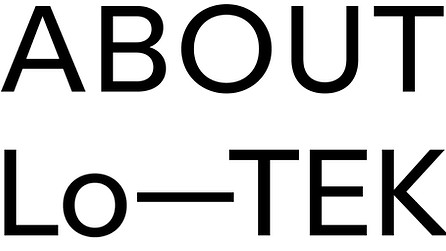Elevating
Traditional
Ecological
Knowledge
The ideas behind Lo—TEK were first introduced in the bestselling book Lo—TEK: Design by Radical Indigenism, and further expanded in its follow-up, Lo—TEK Water: A Field Guide for TEKnology. Together, these publications embody the technologies of over forty local communities and form a foundation for a growing appendix of work that documents and celebrates the intelligence of ecosystems shaped by human hands in relationship with nature.
“A visual masterpiece and manifesto that urges us to rethink progress.”
— The Guardian




Lo—TEK
Design by Radical Indigenism




Lo—TEK Water
A Field Guide for TEKnology
Lo—TEK is a design movement and research framework that reintroduces Indigenous and ancestral technologies as critical tools for addressing climate, ecological, and urban challenges. Coined by designer, author, and educator Julia Watson, through her collaborative work with 18 indigenous communities around the globe, Lo—TEK offers a counterpoint to high-tech, extractive systems that dominate mainstream approaches to sustainability.

Through years of fieldwork, collaboration with Indigenous knowledge-holders, and interdisciplinary research, Lo—TEK has become a growing body of work that documents and recognizes the ingenuity of ecosystems shaped through the partnership of humans and the natural world. These systems include living infrastructures such as floating farms, water temples, forest islands, and terraced landscapes—technologies that are not relics of the past, but blueprints for regenerative futures.

Lectures
Aman New York
Members Event
New York, NY
February 11th, 2026
Washington University
Beyond Women in Architecture
St Louis, Missouri
March 23, 2026
Pratt Institute
Landscape Architecture Lecture Series
Brooklyn, NY
April 16th, 2026
Congreso de Arquitectura LATAM 2026 AIA México
Mexico City, Mexico
April 21-23, 2026
What began as a book—has evolved into a global movement, the Lo—TEK Institute, and the co-design of the Lo—TEK Office for Intercultural Urbanism. These aligned initiatives support education, research, and practice rooted in ancestral systems and created in collaboration with communities around the world.
Ecosystem


The Lo—TEK book series is an archive and catalyst, documenting case studies of Traditional Ecological Knowledge while providing design frameworks that guide the Lo—TEK Institute and Office. It serves as a foundation for not only architects and designers but for educators, environmentalists and anyone looking to integrate nature, community and technology into their work.
The Lo—TEK Institute, cofounded by Julia Watson and with Melissa Hunter Gurney, is the educational and advocacy branch of the Lo—TEK ecosystem, turning applied research and fieldwork into accessible, transdisciplinary learning. Through curriculum, a nature based technologies database, and land-based programs, it advances professional development while advocating for the integration of Indigenous science and Traditional Ecological Knowledge into education and practice to foster climate literacy and regenerative futures.


The Lo—TEK Office for Intercultural Urbanism, advised by a majority indigenous council of practitioners and co-led by Indigenous and non-Indigenous designers and scientists, is the applied research arm of the ecosystem. Its practice integrates research and knowledge building, design and planning, public engagement, cultural stewardship, and systems transition—applying Traditional Ecological Knowledge to resilient, culturally grounded, and climate-responsive solutions across multiple scales and sectors.
Lo—TEK, an acronym for
(Lo)cal + (T)raditional
(E)cological (K)nowledge
TEN Principles of TEKnological Urbanism
Lo—TEK’s urbanist framework challenges the conventional architectural paradigm of "form follows function," proposing instead that urban design follow "form follows flux," prioritizing adaptability to dynamic environmental and cultural contexts. Conceived by Julia Watson, TEKnological Urbanism draws on Indigenous practices, showing how ancestral technologies provide sustainable solutions closely aligned with local ecosystems and cultural narratives. By integrating these time-tested methods with contemporary design, Watson envisions cities that are resilient, ecologically integrated, socially equitable, and culturally rooted. Introduced in Lo–TEK Water: A Field Guide for TEKnology, the framework’s ten principles offer practical guidance for translating ancestral knowledge into climate-resilient urban design, serving as tools for practitioners, educators, and policymakers alike.
1. Spirituality & Cultural Continuity embeds sacred stories, rituals, and land-based relationships into the form of the city. 2. Collective Governance & Co-Design ensures urban planning is co-created with Indigenous communities through ethical, reciprocal partnerships. 3. Commons-Based Resource Management treats air, land, and water as shared responsibilities rather than private assets. 4. Ancestral Technologies as Innovation revives traditional ecological systems as regenerative urban infrastructure. 5. Indigenous Multispecies Urbanism designs cities for coexistence with all life forms and local ecologies. 6. Water-Centered Urban Planning shapes cities through the rhythms and flows of water. 7. Living Systems Over Concrete replaces static infrastructure with nature-based systems that restore ecological continuity. 8. Bioclimatic & Water-Based Architecture uses local, water-responsive materials to support climate balance and regeneration. 9. Regenerative Production Systems structure urban economies around circular, low-impact resource flows. 10. Water, Energy & Waste Regeneration transforms urban waste and water into clean energy and ecological renewal.








